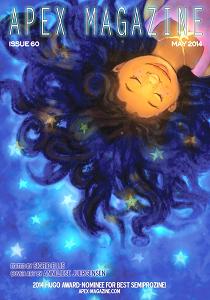Reviewed by Stevie Barry
Caroline M. Youachim’s “Paperclips and Memories and Things That Won’t Be Missed” is a short, poignant ghost story. It’s told by one of the ghosts, who shares the house with an elderly spirit, her own dead baby, and her still-living husband’s second family. As the title might suggest, the dead take “little things that won’t be missed,” in an effort to feel an echo of their lost lives. The narrator has some potentially sinister abilities, but she remains harmless for the sake of her husband and his family. A sad and introspective story, it will tug on the heartstrings of parents in particular.
“Falling Leaves,” by Liz Argall, is set in a harsh and unforgiving post-apocalypse Australia, following two adolescent girls, Nessa and Charlotte, as they struggle to adapt to their bleak reality. One native to the content, the other a refugee, each finds a rough sort of solace in the other’s company because they have so little else.
It’s an incredibly effective story. The world in which they live is painted vividly, the descriptions sparse but brutally easy to picture. The two come from vastly different backgrounds, and hold different places in their current society, and that disparity hammers home just what life has become for the survivors. While the cause of the apocalypse is never stated outright, the result shows just how fierce humanity’s hold is on its idea of what civilization should be. Their culture clings desperately to what it once was, but it’s a thin veneer that struggles to conceal how far they have fallen.
The girls, being young, see through the fractured mask. The “un-landed” refugees can disappear at a moment’s notice, for infractions that are often ignored in the native and “landed” populations. While the adults consciously ignore it, both find it unfair, and Nessa, a landed refugee herself, is infuriated by it. The pair see little use in pretending, and sometimes wonder if survival is worth it.
Their youth is what makes the story particularly heartbreaking. Nessa in particular is jaded far beyond her years, but she still holds hope that things will one day improve. She and Charlotte hold to each other because each is all the hope the other really has. However terrible their world is, the tale ends not on a note of despair, but of their forceful determination.
If E. Saxey‘s “Not Smart, Not Clever” isn’t a pure satire, it certainly comes across as one. In an unspecified future, universities and students have become obsessed with plagiarism at the expense of actual education. Schools use both facial-recognition and brain-recognition software to weed out potential plagiarists; students, in turn, come up with complex software to defeat them and the myriad other criteria that might destroy academic careers. Good grades are cause for fear, not pride, as A-essays are likely to be investigated on suspicion of plagiarism.
The narrator makes a lucrative living off these fears, all while knowing the students who scramble for their degrees have only debt and unemployment to look forward to. The story takes the current problems of education and employment and magnifies them in a funhouse mirror. The message is a bit heavy-handed, but nevertheless often funny.
 Apex #60, May 2014
Apex #60, May 2014